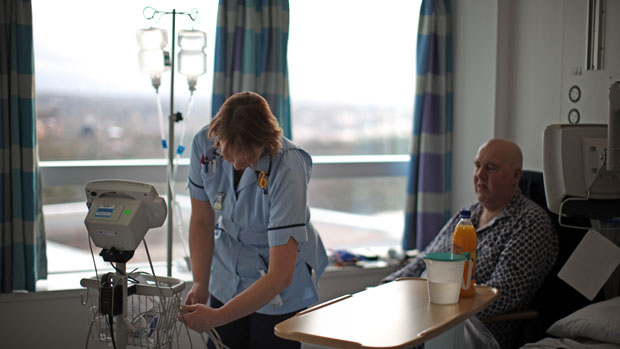NHS to charge 'health tourists' for non-urgent care
Jeremy Hunt announces new plan forcing hospitals to check patient eligibility for free services

A free daily email with the biggest news stories of the day – and the best features from TheWeek.com
You are now subscribed
Your newsletter sign-up was successful
NHS trusts will be forced to collect upfront payments from overseas patients before giving them non-urgent care, Health Secretary Jeremy Hunt has announced.
The move, which starts in April, is designed to cut down on so-called "health tourists", who "could be refused operations unless they agree to cover their costs in advance", the BBC says.
Emergency treatment will still be provided for overseas patients and an invoice will be sent afterwards.
The Week
Escape your echo chamber. Get the facts behind the news, plus analysis from multiple perspectives.

Sign up for The Week's Free Newsletters
From our morning news briefing to a weekly Good News Newsletter, get the best of The Week delivered directly to your inbox.
From our morning news briefing to a weekly Good News Newsletter, get the best of The Week delivered directly to your inbox.
Hunt said the proposal would help government efforts to recoup up to £500m each year, which it plans to reinvest in the NHS.
"We have no problem with overseas visitors using our NHS as long as they make a fair contribution, just as the British taxpayer does," he said.
The new rule also "raises the prospect of patients having to produce their passports and other identity documents before receiving most kinds of treatment", The Guardian reports.
Shyamantha Asokan, from medical charity Doctors of the World, told the paper that forcing identity checks on patients could have a negative impact for vulnerable people.
A free daily email with the biggest news stories of the day – and the best features from TheWeek.com
She said: "They're often very worried about going to a hospital because they are worried about being asked for documents they don't have or being asked to pay.
"A lot of the doctors who volunteer for us don't want to be made into border guards."
The British Medical Association is seeking more information about how the new rules will be implemented.
"There is no detail as to how upfront charging will be introduced from scratch in just three months in an NHS already unable to cope with normal operations," it said.
-
 The ‘ravenous’ demand for Cornish minerals
The ‘ravenous’ demand for Cornish mineralsUnder the Radar Growing need for critical minerals to power tech has intensified ‘appetite’ for lithium, which could be a ‘huge boon’ for local economy
-
 Why are election experts taking Trump’s midterm threats seriously?
Why are election experts taking Trump’s midterm threats seriously?IN THE SPOTLIGHT As the president muses about polling place deployments and a centralized electoral system aimed at one-party control, lawmakers are taking this administration at its word
-
 ‘Restaurateurs have become millionaires’
‘Restaurateurs have become millionaires’Instant Opinion Opinion, comment and editorials of the day
-
 A real head scratcher: how scabies returned to the UK
A real head scratcher: how scabies returned to the UKThe Explainer The ‘Victorian-era’ condition is on the rise in the UK, and experts aren’t sure why
-
 How dangerous is the ‘K’ strain super-flu?
How dangerous is the ‘K’ strain super-flu?The Explainer Surge in cases of new variant H3N2 flu in UK and around the world
-
 The ‘menopause gold rush’
The ‘menopause gold rush’Under the Radar Women vulnerable to misinformation and marketing of ‘unregulated’ products
-
 How the care industry came to rely on migrant workers
How the care industry came to rely on migrant workersThe Explainer Government crackdown on recruiting workers abroad risks deepening care sector crisis, industry leaders warn
-
 Could medics' misgivings spell the end of the assisted dying bill?
Could medics' misgivings spell the end of the assisted dying bill?Today's Big Question The Royal College of Psychiatrists has identified 'serious concerns' with the landmark bill – and MPs are taking notice
-
 Washwood Heath: Birmingham's pioneering neighbourhood health service
Washwood Heath: Birmingham's pioneering neighbourhood health serviceIn the Spotlight NHS England chair says there is a 'really good argument this is the model for the future'
-
 The UK's first legal drug consumption room
The UK's first legal drug consumption roomThe Explainer 'Potentially transformative moment in UK drugs policy' as The Thistle opens in Glasgow
-
 How can the UK solve the adult social care crisis?
How can the UK solve the adult social care crisis?Today's Big Question New commission announced to turn our buckling care sector around: yet more delay or finally a way forward?